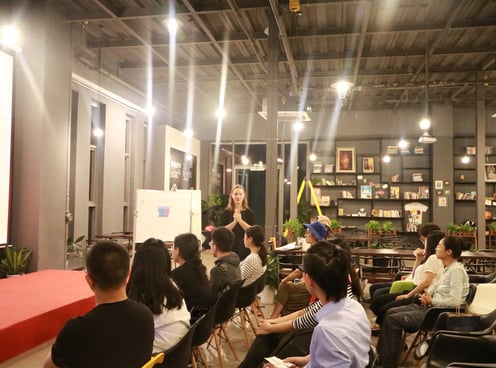Surveillance researcher with a focus on technology governance.


ABOUT ME
Lecturer in Tech & Crime at the School of Criminology and Criminal Justice, Griffith University
Dr Ausma Bernot is a Lecturer in Technology and Crime at the School of Criminology and Criminal Justice, Griffith University.
Her research trajectory is motivated by an ambition to advocate for the responsible use of technology for the benefit of society. Her work has been published in top journals, including "Surveillance & Society", "Intelligence and National Security", and "Internet Policy Review."
Ausma’s doctoral research explored the dynamic interaction between surveillance technologies and social context and questions totalisation of surveillance in China.
When she is not reading or writing about surveillance and intelligence, you can find her exploring Queensland's beautiful nature.
Publications
Bernot, A. (2021). Transnational state-corporate symbiosis of public security: China’s exports of surveillance technologies. International Journal for Crime, Justice and Social Democracy. Advance online publication. https://doi.org/10.5204/ijcjsd.1908 [Original research paper]
Trauth-Goik, A. and Bernot, A. (2021). Decentralising data collection and centralising information in the People’s Republic of China: Decentralise Manage and Service reforms. Surveillance & Society. 19(4), 518-536, 537-553URL: http://dx.doi.org/10.24908/ss.v19i4.14371 [Original research paper]
Siqueira Cassiano, M., Haggerty K., and Bernot A. (2021). China's response to Covid-19 pandemic: Surveillance and autonomy. Surveillance & Society. 19(1) Open Issue. URL: https://ojs.library.queensu.ca/index.php/surveillance-and-society/article/download/14550/9535 [Commentary paper]
Bernot, A., Trauth-Goik A., and Trevaskes S. (2021). Handling Covid-19 with big data in China: Increasing ‘governance capacity’ or ‘function creep’? Australian Journal of International Affairs. Open Access, Online first. https://doi.org/10.1080/10357718.2021.1956430 [Commentary paper]
Bernot, A. and Siqueira Cassiano, M. (2022). China’s comprehensive response to the Covid-19 pandemic: A first anniversary assessment. Journal of Contingencies and Crisis Management. https://doi.org/10.1111/1468-5973.12396 [Original research paper]
Bernot, A. and Trevaskes, S. (2022). Smart Surveillance, Smarter Governance. China Story Yearbook. http://doi.org/10.22459/CSY.2022 [Peer-reviewed chapter]
Trevaskes, S., and Bernot, A. (2023). Surveillance infrastructure in China: Key concepts and mechanisms enhancing the Party-state’s governance ambitions. Global Media and China. https://doi.org/10.1177/20594364231171013 [Original research paper]
Bernot, A. and Smith, M. (2023). Understanding the risks of China-made CCTV surveillance cameras in Australia. Australian Journal of International Affairs. https://doi.org/10.1080/10357718.2023.2248915 [Original research paper]
Bernot, A. and Davies, S.E. (2023). The “fish tank”: social sorting of LGBTQ+ activists in China. International Feminist Journal of Politics. https://doi.org/10.1080/14616742.2023.2261948 [Original research paper]
Bernot, A., Cooney-O'Donoghue and Mann, M. (2024). Governing Chinese technologies: TikTok, foreign interference, and technological sovereignty. Internet Policy Review, 13(1). https://doi.org/10.14763/2024.1.1741 [Original research paper]
Bernot, A. (2024). Police Cloud: Functional modularity in China's cloud public security infrastructure. Regulation & Governance, Early View. https://doi.org/10.1111/rego.12604 [Original research paper]
Media and Speaking Engagements


The Interpreter [Blog post] (2022, Mar 16) Social media in times of war. Read the article here
CDAO-Brisbane [Speaking] (2022, Mar 8) Shared my research findings at the conference on the topic 'Big Data Monitoring and Use in China'
The Conversation [Article] (2022, Jul 21) Even if TikTok and other apps are collecting your data, what are the actual consequences? Read the article here
New Zealand's Department of the Prime Minister and Cabinet (DPMC) [Invited online roundtable talk] (2021, Sep 8) China's information technology exports, police information management infrastructure, and modular application of technology to Covid-19 monitoring.
Australian Centre On China In The World, ANU [Speaking] (2022, May 5) Presented my research on Social Sorting of LGBTQ+ Activists and Organisers in China
Australian Centre On China In The World, ANU [Speaking] (2022, May 10) Part of the panel at the release of China Story Yearbook 2021, "Contradictions"









The Interpreter [Blog post] (2021, Jul 9) China’s forced invisibility of LGBTQ communities on social media. ``
Griffith Asia Institute, Griffith University, Australia [Research Talk] (2021, Apr 15) China’s COVID-19 Pandemic Response: A First Anniversary Assessment
Concordia University of Edmonton, Canada [Research Talk] Bernot, A. and Siqueira Cassiano, M. (2021, Mar 19) Controlling COVID-19 in China: Crisis management one year “in”
Shared my views with Moa Kärnstrand about China's DNA databases. Göteborgs-Posten's article can be accessed : Read the archived article here





The Interpreter [Blog post] (2021, Sep 22) Digital authoritarianism not just a China problem. Read the article here

The Conversation [Article] (2021, Aug 31) 'China's surveillance creep': how big data COVID monitoring could be used to control people post-pandemic. Read the article here


The Conversation [Article] (2021, Oct 26) China is accused of exporting authoritarian technology. But the west has done so, too, more covertly. Read the article here


The Wire [Media interview] (2021, Nov 23) Commentary on policing feminist activism in China, "What has happened to Peng Shuai?" Listen to the interview here

Teaching
My teaching philosophy
“Art of teaching is art of assisting discovery”- Mark Van Doren
My beliefs and intentions in teaching are based on two core elements: learner autonomy and the role of the educator as a content and learning facilitator. My learning practice is therefore based on techniques of scaffolding knowledge and skills, while encouraging learners to be self-directed. To achieve that, I build on Ella Kahu’s student-centred theory of holistic engagement and use active and formative learning tools, such as Griffith’s Active Learning Design Tool and classroom assessment techniques for formative learning. Through creating an engaged teaching presence and growing a Community of Inquiry, I aim to create an environment where learners can independently identify multiple sources of support.
When teaching more experienced and autonomous learners, I apply the principles of Learner-Led Education. Learner-Led Education incorporates learning approaches that are constructivist, transformative, and problem-based. These techniques help in growing self-regulated learners who are familiar with the process of learning, key components of academic success, and the resources and support available to them.
Recognition




In recognition to my teaching experience and skills, Advance HE has inducted me as Fellow of Higher Education Academy (FHEA)
Teaching Portfolio
School of Criminology and Criminal Justice
Tutor
Social Science Research Methods
Understanding Social Problems
Criminology Skills (Open Universities Australia )
Homicide
Course coordinator
Social Science Research Methods (Open Universities Australia)
School of Social Science
Tutor
Introduction to Criminology
This mix of pedagogical approaches moves me as the educator into the background role of a facilitator and creates a student-centred teaching and learning environment. By gauging learner-generated activities and inputs, I create an environment where learners play an active role in critical review, analysis, and appraisal of study materials.
School of Humanities and Social Sciences
Casual lecturer
Crime, Surveillance and Society



Selected Grants and Awards


2023 National Library of Australia, Asia Study Grant
2022 Griffith Asia Institute research grant for "Institutional dimensions in Indonesia's open data implementation"
2022 Australian Centre on China in the World, Library Fellowship, Australian National University
2019 Griffith University Postgraduate Research Scholarship & Griffith University International Postgraduate Research Scholarship
2013 Ningbo Government International Student Scholarship for Academic Excellence for exemplary academic performance
